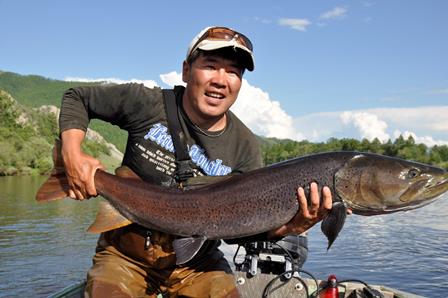The University of Maine at Presque Isle will host Dr. Olaf Jensen, a scientist who has worked since 2007 to study and conserve Mongolia’s unique lake and river ecosystems, for an evening presentation on Thursday, Jan. 29 at 7 p.m. in the Campus Center. Dr. Jensen’s talk, titled The River Wolf and the Blue Pearl: Conservation of Endangered Salmonids in Mongolia, will focus on several of Mongolia’s fish currently at risk, including the Hucho taimen, the largest trout in the world.
Presented by the Environmental Studies and Sustainability Program, College of Arts and Sciences, this talk is free and the public is invited to attend.
Dr. Jensen is an Assistant Professor at the Institute of Marine and Coastal Sciences at Rutgers University and a faculty member with the Mongolian-American Aquatic Ecology Research Initiative [MAAERI], a group of scientists dedicated to understanding and conserving Mongolia’s lake and river ecosystems.
During his talk, Dr. Jensen will discuss the threats to the lakes and rivers of Northern Mongolia, which are among the most pristine freshwater ecosystems in the world. Climate change, overfishing, and mining have placed several of Mongolia’s salmonid fishes at risk. The Hucho taimen have become the target of growing recreational fisheries despite the fact that taimen are classified as endangered on Mongolia’s red list. Dr. Jensen will share details on a five-year mark-recapture and telemetry tag study in the Eg-Uur river system that is helping to find answers on how best to conserve the fish and optimize habitat.
He will also discuss the fascinating research possibilities of one of the region’s lakes in particular. Lake Khovsgol is 80 miles long, 30 miles wide, 800 feet deep, and is reputed to have the clearest and cleanest lake water on Earth: one can see the bottom in 60 feet of water. The 17th largest lake in the world by volume is relatively free of human impacts like urban development, pollution, overfishing, and invasive species. Interestingly, the Lake Khovsgol region has experienced an air temperature increase of more than 2 degrees Celsius over the past 40 years—a rate more than three times faster than the Northern Hemisphere average—and the drying of tributary streams is threatening the endangered Khovsgol grayling. Dr. Jensen will discuss the potential for Lake Khovsgol to serve as a model system for understanding climate change effects on aquatic ecosystems.
Dr. Jensen’s visit to UMPI was made possible through a connection with David Putnam, archaeologist/climate scientist and UMPI faculty member. Putnam and Dr. Jensen participated in a research trip to Mongolia this past summer and their joint research resulted in some fascinating hypotheses linking past climate to the speciation of fish in the Great Lakes Basin of Mongolia. Both are expected to continue this research with another trip to Mongolia this coming summer.
Dr. Jensen has been a member of MAAERI since 2007, when he joined the Mongolia Taimen Project’s research team at the Eg-Uur River. He is now the principal investigator on several MAAERI research projects and leads teams of U.S. and Mongolian scientists and students on field expeditions to the Eg-Uur River and Lake Khovsgol. His research focus is fish ecology and fish population dynamics.
Originally from Callicoon, NY, Dr. Jensen earned his Bachelor’s degree in Biology & Society from Cornell University, and his Master’s degree in Marine Science from the University of Maryland Chesapeake Biological Lab. He conducted his Ph.D. research at the University of Wisconsin Center for Limnology, followed by a Smith Conservation Research Fellowship at the University of Washington. His research interests are a mix of fisheries science and aquatic (marine and freshwater) ecology.
All are invited to attend Dr. Jensen’s talk. For more information about this event, contact the University’s Community and Media Relations Office at 207-768-9452.
